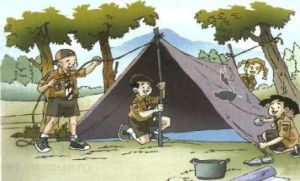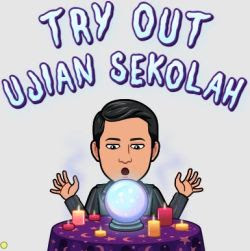- Why is the applicant interested in the position?
- He works at ABC Company.
- He has the qualifications for the job.
- He has been working as a supervisor.
- He has two years’ work experience.
- From the text, we know that the applicant ....
- is qualified for the job
- is working as a supervisor
- will be accepted as a worker there
- will be interviewed as soon as possible
- “Thank you for your consideration...” (paragraph 3).
The underlined word in the sentence refers to ....- Suara Rakyat
- Robby Willie
- HRD Manager
- Engineer
Choose the appropriate expression to complete the dialogue.- Wendy: Geopark is the best tourism destination. It offers us an amazing view.
Erwin: I agree ....
Wendy: How about going there next week?- I must say that I hardly like Geopark.
- I prefer Geopark to the other destinations.
- We’d better say something about Geopark.
- I’d rather go somewhere other than Geopark.
Read the following text and answer questions 5 to 7.ANNOUNCEMENT
According to international regulations for security in the Airport, the following goods are forbidden from being brought aboard a plane, either in passenger’s carry – on bags or checked luggage:
- sharp tools,
- guns,
- radio – active and magnetic materials,
- poisons, and
- any other dangerous goods.
Our security officers will check before passengers board a plane using X-Ray machines and manually.
Before you fly, you should know the basic baggage rules and common security regulations in an airport to avoid problems. Thank you for your attention. Have a safe and nice trip.
- What is the topic of the text?
- A list of prohibited goods on airplanes.
- The language checking system in the airport.
- Information about dangerous goods in the airplane.
- International regulations for security in the airport.
- What should the passengers do before flying?
- Prepare their goods for inspection.
- Know how to reach the airport quickly.
- Check the goods they are going to bring.
- Know the basic baggage and security rules.
- “..., the following goods are forbidden from being brought .... “
What is the synonym of the underlined word?- Banned
- Allowed
- Permitted
- Admitted
Choose the appropriate expression to complete the dialogue.- Winda: The new park is recommended for a family holiday. What is your opinion?
Hana: .... The road is difficult and dangerous.
Winda: Yeah, the road is terribly damaged and too narrow.- I don’t think so.
- I couldn’t agree more.
- That’s absolutely right.
- That’s exactly what I think.
Choose the appropriate expression to complete the dialogue.- Mina: I cannot concentrate on the lesson today. I’m too hungry.
Yanti: Well, if you had breakfast today, you ....
Mina: Yes I know that.- will concentrate today
- would be very hungry
- would not be that hungry
- wouldn’t have been hungry
Choose the appropriate expression to complete the dialogue.- Sinta: What’s the matter? You look very pale.
Vania: I guess I’m too tired. Our sports teacher made us run ten kilometers.
Sinta: ....- You can borrow my money.
- Let me give you a thick cloth.
- Would you like me to turn on the AC?
- Would you care for a bottle of fresh water?
Choose the appropriate expression to complete the dialogue.- Ine: We’re having a graduation party for my daughter tomorrow ....
Rara: I’d be delighted to. What time should I come?
Ine: At 7 p.m. Don’t forget to come with your fiancé.- Are you busy tomorrow?
- May I come to your house?
- Would you like me to come?
- Would you come to my house?
Choose the appropriate expression to complete the dialogue.- Lia: Hi, Dhita. I’m in Singapore right now. Do you want anything from here?
Dita: Oh, I really want a small leather bag from Orchard Road ....
Lia: Okay, no problem.- I have it soon.
- I will buy one for you.
- I was going to tell you.
- I will send you the money.
Read the following text and answer questions 13 to 16.
Antibiotics are a kind of natural and synthetic compound. They are used to stop or to restrain the process of an organism’s growth, particularly bacteria. They can help to cure bacterial infections. However, antibiotics are different from disinfectants in the bacteria killing process. A disinfectant kills bacteria by creating an unnatural environment for germs to live.
In terms of treatment, antibiotics kill bacteria instantly without injuring those infected. Although, antibiotics are good for medication, they are not effective in handling infection caused by viruses, fungi, or other nonbacterial substances.
Antibiotics are classified based on their effectiveness against bacteria. There are antibiotics that kill negative or positive bacteria and some antibiotics have a wider spectrum. The effectiveness depends on the location of the infection and the ability of antibiotics to reach the location of the infection.
- What is the main idea of the third paragraph?
- The use of antibiotics in the treatment.
- The effectiveness of antibiotics against bacteria.
- How antibiotics reach the location of infection.
- The classification of negative and positive bacteria.
- What is the purpose of the text?
- To describe antibiotics in general.
- To promote the use of antibiotics.
- To tell people how to use antibiotics.
- To persuade people to use antibiotics.
- How do antibiotics differ from disinfectant in killing bacteria?
- Disinfectant usually kills the bacteria sufferer.
- Antibiotics kill bacteria by injuring the sufferer.
- Antibiotics kill bacteria without injuring the sufferer.
- Disinfectant kills bacteria without injuring the sufferer.
- “They can help to cure bacterial infections” (Paragraph 1),
The underlined word refers to ....- bacteria
- organism
- antibiotics
- compound
Read the following dialog and answer questions 17-18.
Bimo: Did you watch the football game last night?
Sanny: I had no time. The meeting lasted until very late at night.
Bimo: That’s too bad. The game was very tough, but finally my favorite team won.
Sanny: I wish I had watched it. It was the game I had been waiting for.
Bimo: What time did you arrive home, anyway?
Sanny: At eleven. Can you imagine how tired I was?- What is the topic of the dialogue?
- Sanny’s activity.
- Sanny’s meeting.
- The football game.
- Bimo’s favorite team.
- What can we conclude from the dialogue?
- Sanny didn’t watch the football game.
- Bimo won the football game last night.
- The football game finished at 11:00 p.m.
- The meeting was not too long yesterday.
Read the following dialog and answer questions 19-21.
Cathy: The holiday season is coming. Are you planning a trip, Rika?
Rika: Of course!. I’m going to leave for Japan with my cousins.
Cathy: Great! It will be summer in Japan. You can enjoy the festivals
Rika: Yes. I can’t wait to walk along the street wearing a kimono.
Cathy: I’m sure it will be fun. Have a nice holiday, Rika.
Rika: Thanks, Cathy.- What is the topic of the dialogue?
- Cathy’s holiday plan
- Rika’s holiday plan
- Cathy’s last trip to Japan
- Rika’s wish for a holiday
- What can we conclude from the dialogue?
- Cathy wants to take a picture in Japan.
- Cathy is going to Japan with her cousins.
- Rika is going to enjoy the summer.
- Rika is eager to wear a kimono in Japan
- “Are you planning a trip?” (Line 1)
The underlined word has a similar meaning with ....- making
- arranging
- changing
- modifying
Read the following text and answer questions 22 to 24.How to clean an LCD Screen
First Steps:
- Shake up the detergent and put it 15 – 20 cm away from the LCD Screen.
- Spray on the LCD Screen surface directly.
- Clean gently using the fabric or cotton cleanser
Second Steps:
- Spray the detergent on the fabric or cotton cleanser
- Clean the LCD Screen surface to make it as bright as a new one
- What should you do to the detergent first?
- Spray it
- Clean It
- Put it away
- Shake it up
- Before cleaning the screen surface, we spray the detergent on the screen surface directly or spray it on ....
- our fingers
- the paper
- fabric or cotton cleanser
- brush or fabric cleanser
- “Clean gently using the fabric or cotton cleanser”. (Step 3).
What does the underlined word mean?- Carefully
- Directly
- Harshly
- Cleanly
Read the following text and answer questions 25 to 27.Orchard Road is a boulevard which becomes business and entertainment center in Singapore. Orchard Road is surrounded by a lush tropical and flower gardens which are beautiful. At first, Orchard Road is just a suburban street lined with orchards, plantations nutmeg, and pepper farming. However, in the 1970s, it turned into a shopping center in Singapore. In 1960 and 1970 entertainment industries began to enter this road. Shopping centers such as mall and plaza was built in 1974.
Orchard Road runs along about 2.2 km. This road is one-way street flanked by a variety of shopping malls, hotels and restaurants. The shopping area which is nearly 800,000 square meters provides a wide range of things, food, and entertainment. In this area there are many options that can satisfy visitors from all walks of life starting from the luxury branded things to the popular branded, from exclusive restaurants to fast food.
There are so many ways that can be accessed to get to Orchard road such as: by taxi, bus or drive your own car. For those who are driving to Orchard Road can be entered from the west through the Napier Road. Vehicles from Dunearn Road can turn to left at the intersection of the Marriott Hotel junction. Vehicles that come from Paterson can turn right onto Orchard Road. Orchard is always crowded so you have to be careful in order not to get lost.
- In the third paragraph the writer describes ....
- The location of Orchard Road
- The things that we can see at orchard road
- The direction to get to Orchard Road
- The distance of Orchard Road
- “However, in the 1970s, it turned into a shopping center in Singapore.”
The word “it” in the above sentence refers to ....- The plantation
- Luxury branded thing
- Singapore
- Suburban street
- "In this area there are many options that can satisfy visitors from all walks of life ...."
The underlined word has the closest meaning to ....- Please
- Frighten
- Threat
- Love
Read the following dialog and answer questions 28-29.
Arman: Can you help me prepare the material for the meeting?
Lila: I’m sorry, I have to go to the hospital for a general check-up
Arman: What’s the matter? Are you ill?
Lila: No, everything is just fine. I’m going to go to Mecca as a Haj Pilgrim.
Arman: When are you going to leave?
Lila: Next month. I’m still preparing the documents.
- From the dialogue, we know that ....
- Arman is having a meeting now.
- Lila will go to Mecca next month.
- Arman prepares the material with Lila.
- Lila cannot help Arman because she is ill.
- “.... to the hospital for a general check-up” (Line 2)
The synonym of the underlined word is ....- mandatory
- common
- specific
- physical
Choose the appropriate expression to complete the dialogue.- Vita: Shall we go to the movies together?
Nirina: .... I’ll make the popcorn and orange juice.
Vita: That’s a good idea. I have some new films.
- I’d rather watch the movie.
- I suggest we should have stayed at home.
- We should have lunch at home.
- Why don’t we watch a DVD at home?
Read the following dialog and answer questions 31 to 32.
Rio: What do you usually do in your leisure time?
Juli: I usually take an aerobics class. How about you?
Rio: I play football.
Juli: Great! How often do you play football?
Rio: Twice a week.
Juli: I take the aerobics class twice a week, too, but I don’t like football.
Rio: Well, most women don’t like football.
Juli: That’s true. I’m scared of being hit by the ball.
- From the dialogue, we can conclude that ....
- Rio likes what Juli does in her leisure time
- Rio and Juli have the same hobby
- Rio and Juli spend their leisure time differently
- Rio and Juli do their hobbies at different times
- Why doesn’t Juli like football?
- She is a woman.
- She dislikes Rio.
- She is afraid of the ball.
- She takes aerobics classes.
Read the following text and answer questions 33 to 35.That day was my first day of school. My family and I had just moved to the city the previous week so I didn’t know anyone there. I went to school on the school bus. Everyone seemed to know one another while I was just sitting quietly in the back row.
When we arrived at school, I got my schedule. It was very tight. I marked Tuesday since there was English, my favorite subject, on the day. Friday would be hard because there were maths and physics. It was a relief that we didn’t have to go to school on Saturday.
At break time, I heard some students complaining about the food in the canteen. I thought it was tasty enough. The only problem I had was where to sit. I felt awkward about joining any table. Fortunately, someone asked me to join her. Patricia was her name and she has become my best friend since that day.
- What is the purpose of the text?
- To give information about the high school.
- To describe the writer’s former school.
- To retell the readers the writer’s first day at high school.
- To tell the readers how to attend high school.
- The second paragraph mainly talks about ....
- The high school days.
- The writer’s schedule.
- The lessons at high school.
- The holiday in high school.
- “I thought it was tasty enough.” (paragraph 3)
The underlined word has the same meaning as . . . .- expensive
- sour
- tasteless
- delicious
Read the following text and answer questions 36 to 38.A study has shown that drinking coffee or tea or a combination of the two may be related to a lower risk for stroke and dementia.
Researchers from China's Tianjin Medical University studied 365,682 participants from the UK Biobank, aged 50 to 74. All the participants reported their coffee and tea intake habits. During an average follow-up of 11.4 years for new-onset disease, 5,079 participants developed dementia, and 10,053 had at least one stroke.
According to the study published in PLOS Medicine, people who drank two to three cups of coffee or three to five cups of tea every day, or a combination of four to six cups of coffee and tea, had the lowest incidence of stroke or dementia.
Compared with those who drank neither coffee nor tea, people who drank two to three cups of coffee and two to three cups of tea daily had a 32 percent lower risk of stroke and a 28 percent lower risk of dementia.
Meanwhile, a lower risk of post-stroke dementia was associated with drinking coffee alone or in combination with tea, according to the study.
The researchers also evaluated the link of coffee types with stroke and dementia. Among ground coffee, instant coffee, and decaffeinated coffee, they found that ground coffee drinkers were associated with a much lower risk of dementia, Alzheimer's disease and vascular dementia.
Coffee is a rich source of antioxidants and bioactive compounds while tea contains caffeine and catechin which have neuroprotective properties, such as anti-oxidative stress and anti-inflammatory effects.
(Source: https://en.tempo.co/read/1561276/drinking-coffee-tea-related-to-lower-risk-for-stroke-dementia-study)
- What is the text about?
- Increasing risk of stroke and dementia
- A combination of drinking tea and coffee
- The benefit of drinking coffee or tea
- Researchers from China's Tianjin Medical University
- According to the text, which of the following is NOT true?
- The participants of the study ranged from 11.4 to 74 years of age.
- Drinking coffee and tea may bring beneficial effects on our health.
- Coffee types are related to the the risk of stroke and dementia.
- Drinking coffee or tea may lower the risk for stroke and dementia.
- "Among ground coffee, instant coffee, and decaffeinated coffee, they found that ground coffee drinkers were associated with a much lower risk of dementia, Alzheimer's disease and vascular dementia."
What does the underlined word refer to?- Coffee drinkers
- Types of coffee
- People with stroke or dementia
- Researchers
Read the following dialogue and answer questions 39 to 40.
Secretary: Good morning, PT. Wijaya. May I help you?
Sinta: Good morning. It’s Sinta from PT. Angkasa. Can I speak to Mr. Arman please?
Secretary: I’m afraid Mr Arman’s in a very important meeting at the moment. Would you like to leave a message?
Sinta: Yes – could you ask him to call me as soon as he's available?
Secretary: Allright. Has he got your number?
Sinta: Yes, he has.
Secretary: Fine – I’ll make sure he calls you as soon as he gets out of the meeting.
Sinta: Thanks.
- Who made the call?
- The secretary
- Sinta
- Mr. Armand
- PT. Wijaya
- What will the secretary most probably do after the dialogue?
- Give Sinta's number to Mr. Arman
- Make a telephone call to Sinta
- Arrange a meeting with PT. Angkasa
- Tell Mr. Arman about Sinta's call













